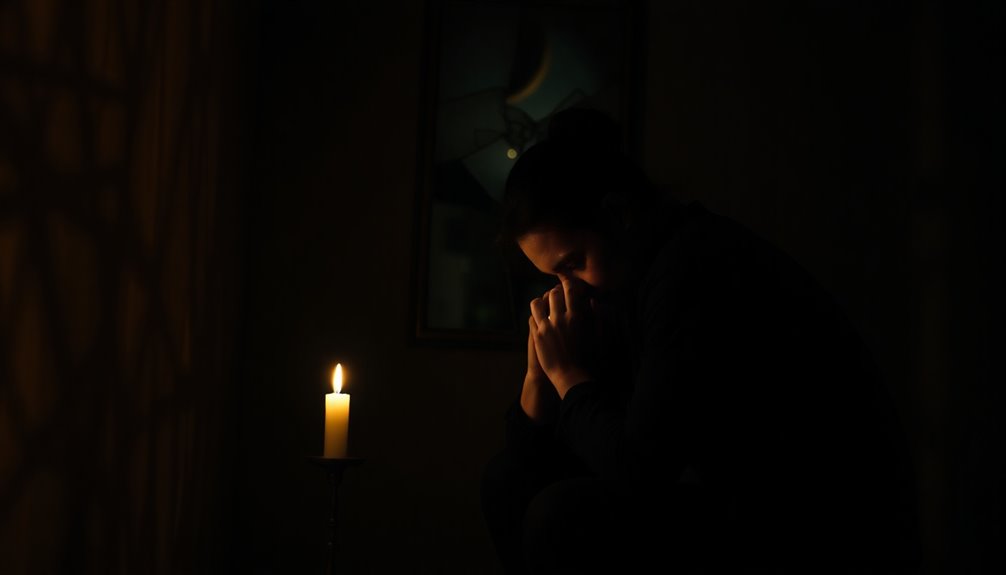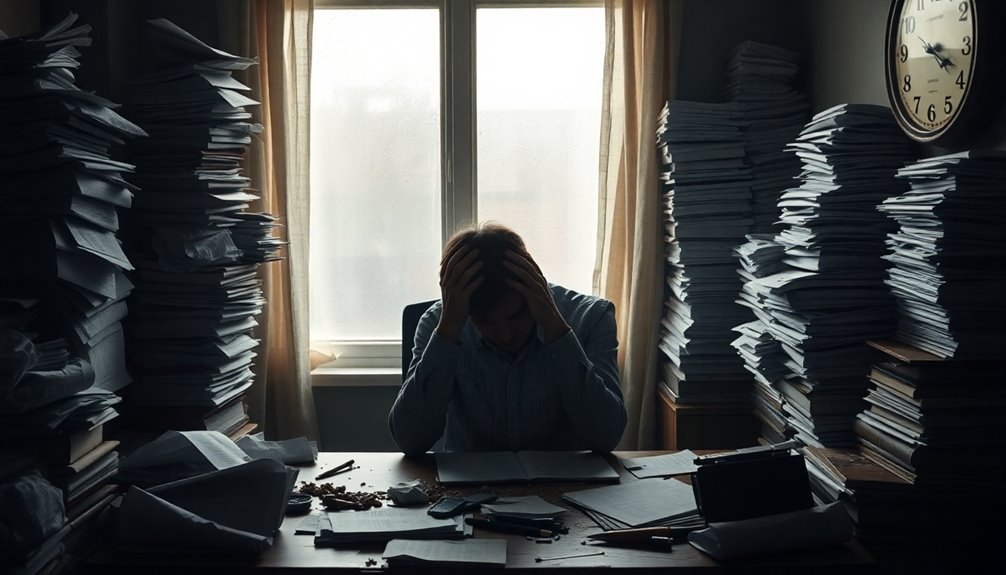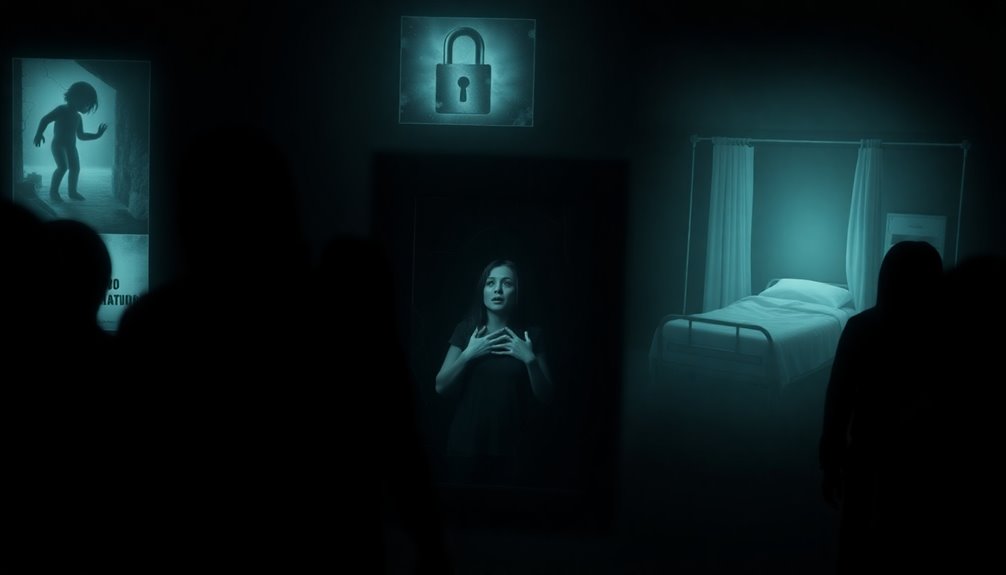You might be a 'weak person' if you recognize these signs. Fear of failure often holds you back, making you avoid new challenges. If you struggle with commitment, that inconsistency can reveal deeper issues with self-discipline. Emotional instability may cause impulsive decisions, and if you find yourself constantly seeking validation from others, it undermines your self-worth. Additionally, if you avoid taking responsibility, you might be trapping yourself in a cycle of powerlessness. Understanding these patterns can be the first step toward personal strength, and there's much more to explore on how to empower yourself further.
Key Takeaways
- Fear of failure prevents you from taking risks, limiting personal growth and opportunities for success.
- Lack of commitment leads to inconsistency, revealing difficulty in overcoming minor obstacles and achieving goals.
- Emotional instability results in impulsive decisions and overwhelming reactions to minor setbacks, hindering personal accountability.
- A constant need for validation from others undermines your self-worth and creates feelings of inadequacy.
- Avoiding responsibility fosters a cycle of powerlessness, limiting personal growth and straining relationships with others.
Fear of Failure

Fear of failure is like a heavy anchor that can hold you back from reaching your full potential. When you let this fear take control, you might avoid risks and shy away from new experiences. This tendency often leads you to stick to familiar paths, causing stagnation and missed opportunities for growth.
You may find yourself paralyzed by the unknown, choosing safety over the rewarding challenges that could propel you forward. Instead of taking responsibility for your choices, you might start blaming others for your inaction. This blame game only reinforces your fear of failure, creating a comfort zone that feels safe but ultimately limits your chances for self-improvement and success.
Research shows that a significant percentage of people avoid taking action due to this emotional barrier, highlighting just how widespread this issue is.
Recognizing your fear of failure is the first step. Understanding its impact on your decision-making can motivate you to break free from the shackles it creates. By facing your fears, you can reclaim your potential and open doors to new opportunities.
Don't let fear define you—embrace the challenges that come your way.
Lack of Commitment

Commitment is essential for achieving personal and professional goals, yet many struggle to maintain it. If you notice a lack of commitment in your life, it could point to deeper issues with self-discipline. You might find yourself making promises but failing to follow through. This inconsistency often reveals a weak-minded person who gives up easily when faced with small obstacles.
When you encounter challenges, do you abandon your plans at the first sign of difficulty? This tendency not only hinders your growth but also leads to missed opportunities. Instead of holding yourself accountable, you may get distracted by excuses, allowing fear of failure to dictate your actions.
Your inability to stay committed to long-term goals may reflect an aversion to risks, resulting in stagnation both personally and professionally. A lack of dedication keeps you from cultivating the resilience necessary to overcome challenges.
Recognizing these signs is the first step towards growth. If you want to break free from this cycle, it's time to reflect on your commitment levels and take active steps to enhance your discipline and dedication.
Emotional Instability

When you're grappling with a lack of commitment, it often leads to emotional instability that can further complicate your journey. You might find yourself making impulsive decisions based on strong emotional reactions rather than logical thought, which shows a lack of control over your feelings.
These mood swings can leave you struggling to maintain your composure during stressful situations, ultimately impacting your relationships and decision-making abilities.
Minor setbacks may trigger an overwhelming response, like anger or frustration, underscoring a fragile emotional state that undermines your resilience. Instead of taking accountability for your actions, you might blame others for your failures, stunting your personal growth.
This pattern can keep you stuck in a cycle of instability, making it hard to regain control of your life. To overcome this emotional instability, it's essential to cultivate emotional resilience and employ effective coping strategies. Learning to regulate your emotions and respond thoughtfully can lead to greater stability and success in the long term. Additionally, practicing visualization techniques can help you align with a more positive emotional state, fostering resilience and clarity.
Need for Validation

The constant craving for validation can feel like a heavy weight, dragging you down and obscuring your sense of self. If you constantly seek approval or praise from others, it's a clear sign that you might've a need to find your worth through external sources. This reliance often stems from deep-seated insecurities that can diminish your self-esteem, making you feel inadequate when you don't receive the validation you crave.
You might notice that this behavior creates a cycle of comparison, where you measure your worth against others. Such comparisons can exacerbate feelings of inadequacy, leading to emotional exhaustion for both you and those around you. They may feel pressured to reassure you, which can strain relationships.
Recognizing these patterns is essential; they're often signs of a weak-minded approach to self-acceptance.
Avoiding Responsibility

Often, people sidestep responsibility by blaming external factors or others for their shortcomings. When you avoid taking responsibility, you hinder your personal growth and accountability. This habit can lead to repeated mistakes since you're not reflecting on your actions or learning from them. Instead of feeling empowered, you may find yourself trapped in a cycle of powerlessness, believing you have no control over your circumstances.
Failing to take ownership can also strain your relationships. Others may view you as unreliable, which can damage trust and connection.
On the other hand, when you embrace responsibility, you become mentally strong. Taking ownership of your actions fosters resilience and encourages a proactive approach to challenges. Additionally, maintaining emotional alignment during conflicts can enhance your ability to navigate difficult situations effectively.
Recognizing this pattern is the first step toward change. Start by acknowledging your role in situations and making an effort to learn from your experiences. By doing so, you can break free from the cycle of avoidance and empower yourself to face life's challenges head-on.
Frequently Asked Questions
How Do I Know if I'm a Weak Person?
To determine if you're a weak person, reflect on how you handle challenges and setbacks.
Do you often avoid risks or stick to your comfort zone? Notice if you make excuses instead of following through on commitments.
Evaluate your emotional responses during tough times—do you stay composed or act impulsively?
Consider whether you seek constant validation from others or blame them for your failures.
Honest self-reflection can help you identify areas for personal growth.
What Are Signs of Weakness in a Person?
Signs of weakness in a person often include a constant fear of failure that keeps you from trying new things, leading to stagnation.
You might struggle to commit, breaking promises easily when faced with challenges.
If your emotions dictate your actions, you may make impulsive decisions and struggle under pressure.
Dependence on others for validation can signal low self-belief, while avoiding responsibility can prevent you from growing and learning from experiences.
How Does a Weak Person Act?
A weak person often avoids taking risks, sticking to their comfort zone out of fear. They may struggle to follow through on commitments, letting small obstacles derail their plans.
You might notice emotional instability, reacting impulsively to minor challenges. They often seek constant validation from others, showing insecurity in their self-belief.
Additionally, they tend to blame others for their failures, missing out on valuable opportunities for personal growth and learning.
How Do I Know I Am Weak?
You might think you're the world's biggest coward if you constantly dodge challenges and stick to your comfy bubble.
If you promise the moon but crumble at the first bump, you're not exactly a superhero.
Can't handle stress without losing it? That's another red flag.
Relying on others' praise to feel good? Ouch!
And if you blame everyone else for your mess-ups, it's time to face the music and take a hard look at yourself.
Conclusion
If you recognize these signs in yourself, it's time to take the reins and steer your life in a new direction. You're not defined by your weaknesses; they're just clouds that can clear to reveal a brighter sky. Embrace growth, seek support, and cultivate resilience. Remember, everyone has their battles, but facing them head-on transforms you from a flickering candle into a blazing beacon. Take that first step, and watch your strength unfold.









